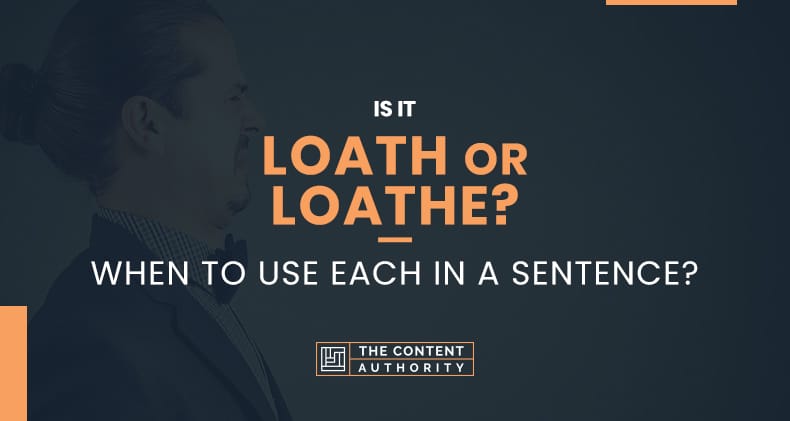It can be quite easy for people to confuse the usage of various words in the English language. This is usually because of the similarities in spelling and pronunciation of these words. One of such situations is in “loath” and “loathe.” So, is it “loath” or “loathe?” When to use each word in a sentence?
“Loath” is an adjective that conveys a feeling of hesitation, reluctance, or unwillingness to get a thing done. On the other hand, “loathe” is a verb that conveys a heightened feeling of disgust at something or someone. You can use either of them in sentences based on the meaning you want to convey.
Still, for you to be adept with the use of both words, there is more you need to know. In turn, in this article, we will dive into the use of both words. This way, you find it easier to use them in a sentence. Let us get right to it!

When to and How to Use the Word “Loath” In a Sentence
The first item for consideration is when to and how to use the word “loath” in a sentence. However, to grasp this, you need to understand the meaning and nature of the word. This is in line with the general idea that the meaning of a word, and of course, its nature influences its usage.
When it comes to the meaning of the word, the word refers to a reluctance or unwillingness to do something. For instance, when you are reluctant to get a chore done because you are disinterested or tired. This meaning is derived from the word’s origin that you can trace to the Old English language. At this time, the word meant repulsive or hateful.
Now, when it comes to the nature of the word, it is an adjective. That is, it functions to qualify a noun within a sentence. For instance, when you say someone is loath, it simply qualifies the state of such an individual as reluctant. Also, this word usually comes with an infinitive verb. For instance, “to run,” “to go,” or “to dance.”
In turn, you use the word “loath” in a sentence when you want to convey that someone is reluctant to get something done. Now, here are some examples of how you use the adjective “loath” in a sentence.
- If there is one thing that the atheist next door is loath to, it is going to church on Sunday with members of his family.
- When I am tired, I am loath to going out on dates regardless of the location and how much I like the person.
- There is nothing that makes me loath to go to school like knowing I have to attend Professor Tyler’s class later in the day.
- There are loads of things that I loath doing and top among them is waking up before 6 in the morning; it messes with my whole day in no small way.
- Although I planned to leave the party early, when I got there, the party was so much fun that I was eventually loath to depart at the time I had planned to leave.
- Unfortunately, some public tertiary institutions in developing countries have been loath to adopt virtual learning in their institution following the pandemic.
When to and How to Use the Word “Loathe” In a Sentence
Next, we will dive into when to and how to use the word “loathe” in a sentence. Once again, we will dive into explaining the meaning and nature of the word to enable you to understand its usage.
This is important is you must understand the difference between both words. Are the words similar and interchangeable, or are both words distinct? Well, we will address all of it below.
Now, when it comes to the meaning of the word “loathe,” it means to feel disgusted or to hate something. This word has its origin in the word “lathian.” This is an Old English word that also conveys spitefulness. As you can see, it is related to the word “loath.”
So, when you use the word “loathe,” you use it to convey a feeling of disgust towards something or someone. It involves feeling an intense disliking for something or someone. However, the nature of the word is distinct from the word “loath.”
While the word “loath’ is an adjective that modifies a noun, the word “loathe” is a verb that functions as an action word within a sentence. However, it is not just another type of verb. Instead, it functions as a transitive verb that comes with a specific or direct object.
In turn, you use the word when you want to convey that someone holds a feeling of disgust to someone or something. For instance, to loathe rock music or a mean and demanding boss.
It would be best if you remembered that while the word “loathe” conveys a feeling of hate, it is a stronger variant. As such, you will hardly find people using the word to describe their feelings towards someone or people. Regardless, here are some examples of its usage in a sentence. This will help you understand better.
- Although I found it quite unbelievable and surprising at first, I have come to accept and understand that dogs and cats often loathe each other.
- There is nothing Tyler loathes more than a woman who fails to arrive at a date at the set time; I guess he really values his time.
- As much as Jean loathes technology, she understands that it has come to stay and does all she can to stay updated about recent happenings in the field.
- I find it amusing that others can loathe their fellow humans; it is too strong a feeling for someone or anyone to feel towards others.
- If you loathe burgers, then I am forced to conclude that you need help because there is no way someone can hate such a delicious meal.
- Loathe him or love him, you cannot deny the fact that Chris is an exemplary employee who continues to put his all into all his activities.
Understanding the Difference Between Both Words
So far, we have identified the meaning of both words. From our discussion above, it is clear that both words convey diffident meaning. So, you are wondering where the confusion related to the use of both words arise.
Well, first, both words sound almost the same. Yes, you can easily categorize them as homophones, and there would be no problem. Even more, they have similar spellings, with the only difference being that one comes with an “e” while the other does not. However, that is hardly the only reason why this confusion is common.
One paramount reason why this confusion is prominent is thanks to the origin of both words. Like you can now tell, both words have a negative meaning. This is because they both come from the same root in Old English, “lath.””
Regardless, these words now convey different meanings, and it is our responsibility to understand their usage. Well, that is what this article has done. Still, beyond understanding or knowing the difference, you also need to remember them when writing. This can be quite tricky, thanks to the similarities that we mentioned earlier.
Well, that does not have to be the case. Here is something that will help you remember the difference when writing.
You will remember that we said the word “loathe” is an elevated version of the word “hate.” That is a stronger feeling of disgust. Well, you need to keep that in mind when trying to use the word “loathe” in a sentence. So, when you want to convey a more powerful meaning than the word “hate,” use the word “loathe.” Just remember that they both end with the letter “e.”
On the other hand, when it comes to the word “loath,” it means hesitant or reluctant to do something. Now, the word “hesitant” is the word you want to keep in mind when using the word “loath.” So, when you want to convey that someone is hesitant to do something, use the word “loath.” Just remember that the letter that ends the word “loath” starts the word “hesitant.”
Final Thoughts

The English language is not without its share of confusing words. In fact, you will come across loads of similar yet distinct words that can confuse you. One of such situations is with the use of the words “loathe” and “loath.” Well, the good news is that no one needs to keep struggling with the use of these words.
In this article, we have explained the meaning of both words. We have also explained the way to use them in a sentence. Then, we ended with the best way to remember the difference between both words when using them. So, read up and be sure to pay attention. After reading this, it will sure become easier to use both words when writing.
Shawn Manaher is the founder and CEO of The Content Authority. He’s one part content manager, one part writing ninja organizer, and two parts leader of top content creators. You don’t even want to know what he calls pancakes.


